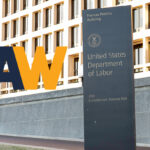The U.S. Federal Trade Commission voted 3-2 on April 23 to ban noncompete agreements that the government body said prevents tens of millions of employees from working for competitors or starting a competing business once they’ve left a job.
The vote came 15 months after the FTC originally proposed a rule that would ban noncompetes, which the agency said covers approximately 18% of the U.S. workforce, or about one in five employees (30 million total), ranging from minimum wage staff to CEOs.
Proponents of the new rule say noncompete deals contributed to wage stagnation, arguing that changing jobs is one of the best ways to secure higher pay. In its proposal, the FTC said that clauses have become so widespread that they now include low-wage workers.
“The freedom to change jobs is core to economic liberty and to a competitive, thriving economy,” FTC Chair Lina Khan in a statement when the proposed rule was first introduced. “Noncompetes block workers from freely switching jobs, depriving them of higher wages and better working conditions, and depriving businesses of a talent pool that they need to build and expand.”
Meanwhile, opposition to the ban — including from the National Association of Wholesaler-Distributors (NAW) — contend that such clauses facilitate employee retention, internal promotion and investments in training, while circumventing longstanding state labor laws.
As part of the new rule — set to go into effect 120 days after it is published in the Federal Register — companies would also have to dismiss existing noncompete agreements for most employees, though in a change from the original January 2023 proposal, the final rule stated that agreements may remain in place for senior executives
A week before the final vote, the FTC said the rule “would generally prevent most employers from using noncompete clauses.”
However, the rule’s application is uncertain, as numerous pro-business groups are certainly expected to take legal action to block it. That includes the U.S. Chamber of Commerce — the nation’s largest pro-business lobbying group.
“The FTC’s proposal not only exceeds the agency’s statutory authority but threatens to exacerbate workforce shortages and impose undue legal burdens on businesses, particularly wholesale distributors,” NAW Chief Government Affairs Officer Brian Wild said in a statement following the FTC vote. “Rather than addressing legitimate concerns, it represents a misguided attempt to micromanage private contractual arrangements.”

Wild elaborated that the ban on non-competes worsens challenges faced by distributors in training and retaining talent amid supply chain disruptions and inflationary pressures.
He added that distributors use non-competes narrowly, for just one or two years, as part of a retention strategy that includes heavy investment in employee training and growth, with those agreements safeguarding investments and sustaining competitiveness.
“The FTC’s actions represent an egregious power grab, well beyond its jurisdiction of antitrust enforcement and consumer protection. This reckless expansion sets a dangerous precedent for regulatory intrusion.”
The FTC’s vote followed more than 26,000 public comments, of which the commission said over 25,000 expressed support for the ban, with health care employees comprising a “significant chunk.”
In its initial proposal, the FTC estimated that the ban would increase U.S. worker earnings by almost $300 billion each year.
In other legal matters involving the U.S. workforce, the noncompete ban vote came just hours after the Department of Labor cleared its long-awaited final rule that will raise salary thresholds for overtime exemptions.
Related Posts
-
NAW cited the Labor Department’s proposed overtime pay and worker walkaround rules as being harmful…
-
The National Association of Wholesaler-Distributors appointed a SVP of Operations, Director of Product Sales and…
-
The Senate bill requests $60.1 billion for Ukraine aid, $14.1 billion for Israel and $20.2…



